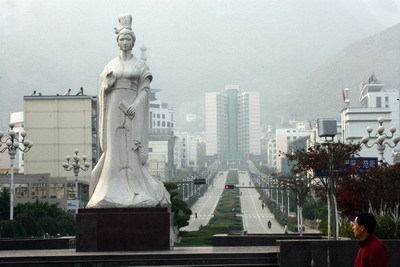Displaced by dam, resettled with dignity
Updated: 2008-01-02 08:24
|
|
It's not easy to differentiate him from other Xintang residents in Guangzhou's suburb, but for his strong Chongqing accent. He shifted from Wanzhou in Chongqing's Three Gorges reservoir area in 2004. Today, he drives a truck for a Hong Kong-funded furniture company, and earns more than 2,000 yuan ($273) a month, something he couldn't have dreamed of as farmer. In three years, he has furnished his new house in Guangzhou, and bought a TV set, a washing machine, an ice-box and an air conditioner.
Zhou is one of the 160,000 reservoir area residents who have resettled in the provinces of Guangdong, Zhejiang, Jiangsu, Shandong, Fujian, Hubei, Hunan, Sichuan, Anhui and Jiangxi, and the municipality of Shanghai. Chongqing officials say dearth of land in the reservoir area necessitated the relocation program.
More than 1.3 million people from 21 counties would have been relocated by next year to make way for the world's biggest hydropower project. By then the water level in the submerged 660-km stretch, mainly in Chongqing municipality and Hubei Province, is expected to rise to 175 meters. About 1.22 million of the displaced had already been resettled by September last year, when the water level reached 156 meters.
Official figures show 9,000 of these people have moved to Guangdong Province since the relocation program began in the early 1990s, and settled in cities such as Guangzhou, Foshan, Huizhou and Zhaoqing. The Guangdong provincial government has spent 215 million yuan ($29.5 million) on resettlement programs, allotting a housing plot to each family and arable land to everyone - equal to the size given to local residents. It has granted subsidy for house building and agriculture, too.
But despite the relative prosperity of their new life, many of the displaced cannot forget their place of birth and that of their forefathers. Zhou, for instance, regrets not being able to put as much spices as he used to in his favorite dishes because the weather and water in Guangzhou is so different from Chongqing's. "We used to eat a lot of chilies. But if we do the same here, we have sore throats and pimples break out on youngsters' faces," he says.
To overcome such conditions, he and his hometown folks have begun drinking bitter herbal tea, which is very popular in Guangdong, especially after eating excessive spicy food.
But adapting to the local way of life is not just finding a "cure for the ills" of spicy food, Zhou says. "We have learned to speak the Cantonese dialect, we have blended local folklore with our custom, and our life is equally, if not more, colorful spending time with the local people." Several of the displaced have even married local residents.
And then there are the children, such as his 11-year-old nephew Zhou Xingyu, for whom Xintang is real home. "Unless I'm at home, I speak Cantonese," says the elementary school student.
"I have made many friends here." His "new school is much better than the one in Wanzhou", where he had to walk half an hour on mountainous roads each way to and from home. "And I can go to the big city of Guangzhou and watch Hong Kong TV programs in Xintang."
The displaced who have moved to Shanghai find more opportunities. One of the 7,500 people who have shifted to the country's commerce capital is Wang Sheng. He was 18 when he reached Chongming with his parents and sister in July 2001. Life was difficult in the beginning, forcing him to ponder many a time why he had to leave his beloved hometown for the "alien environment" of Shanghai. Not understanding the local dialect was all the more reason why he felt like a fish out of water.
But help from his teachers and his determination to overcome all odds raised his hopes. His talent as a sportsman got him admitted to Shanghai University of Sports, from where he graduated last year. Today he works for a primary school in the city, and plans to start a health club of his own.
As a second-generation migrant, Wang is working to move ahead, though he loves looking back at times. "I really cherish the memory (of my hometown) but I think that with the opportunities here, people like me can create a world of our own," he says.
|
|
|
||
|
||
|
|
|
|






